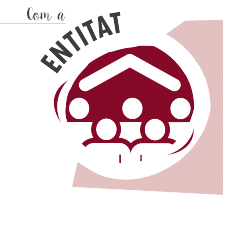Who, how and why do SL?
SL promotes significant and competence-based learning through hands-on practice. It also increases autonomy, responsibility and creativity in learning, helping to sensitise students to issues of social justice.
In addition, it updates and enriches teaching and research at the University and links it to society, promoting partnerships with other social actors. It is therefore an educational approach that fosters social responsibility within the university institution.
An SL experience constitutes a partnership between students, teaching staff and social organisations. Depending on your role, the way you participate may differ. For more information, visit the “I want to take part” section of this website:
SL: How and who?

SL as a student
How to take part:
- By taking a subject that includes SL.
- By suggesting social organisations with which to cooperate.
- By suggesting external placements or final degree projects (TFG or TFM).
How can SL benefit you:
- It fosters a bond with the University and a commitment to the community.
- It substantially strengthens cross-cutting and programme-specific competences through experience and hands-on practice.
- It opens up new avenues for career guidance.
- It enables participants to meet a professional challenge.
- It increases participation and motivation for social involvement.
- It provides the satisfaction of being an agent of social change.

SL as a lecturer
How to take part:
- By integrating service-learning into your teaching.
- By promoting TFGs with SL methodology.
- By suggesting social organisations with which to cooperate.
How can SL benefit you:
- It helps connect teaching to the University’s other two missions: social responsibility and research.
- It fosters the teacher’s role as a facilitator of learning, as promoted by the EHEA.
- It provides an opportunity for innovation by integrating active methodologies into teaching.
- It facilitates training and competence-based assessment.
- It adds a new dimension to teaching and research through partnerships with external organisations.
- It provides feedback on the impact of teaching in a real context.

SL as an organisation
How to take part:
- By sending SL proposals to the University.
- By considering the proposals offered by the University.
- By aiding in the design, implementation and assessment of SL projects with students and teaching staff.
How can SL benefit you:
- It helps form links with the University.
- It promotes close cooperation between students, the community and professionals.
- It helps find specific solutions to the organisation’s real needs.
- It plays a part in training socially committed citizens and professionals.
- It provides feedback on the impact of teaching in a real context.